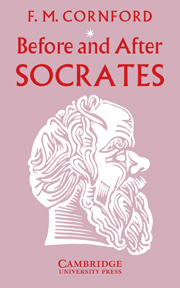IV - ARISTOTLE
Published online by Cambridge University Press: 05 August 2014
Summary
Attracted to Athens by the fame of Plato, Aristotle came from his home in northern Greece in his eighteenth year to become a student of the Academy. Plato was then sixty and had been head of the school for at least fifteen years. No young student has ever been subject to the dominance of a more overpowering personality. Aristotle, of course, became a Platonist, and remained at the Academy for the next twenty years, as the pupil and then as the colleague of Plato, till Plato's death in 347 B.C. In imitation of his master, he wrote dialogues intended, like Plato's own earlier works, for the educated public throughout the Greek world. They were read and admired for centuries after his death; but they have not come down to us. We possess only enough fragments, preserved by other writers, to show us that Aristotle, in this first period of his career, was a whole-hearted Platonist, accepting the theory of ideal Forms, which he was afterwards to renounce.
When Plato died, the headship of the Academy passed to his nephew Speusippus, a man of no marked originality. We have no record of Aristotle's feelings upon the promotion of a colleague immeasurably inferior to himself. We only know that he left Athens with Xenocrates, who was later to succeed Speusippus, and that his attitude towards the Academy, and even towards Platonism, became increasingly antagonistic.
- Type
- Chapter
- Information
- Before and after Socrates , pp. 85 - 109Publisher: Cambridge University PressPrint publication year: 1932



